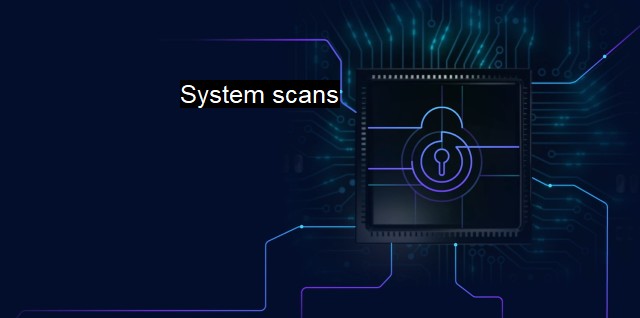What are System scans?
Why System Scans are Vital for Cybersecurity in a Digital Age
System scans, a term routinely used in the context of cybersecurity and antivirus allows for the assurance of maintaining the integrity of information technology systems. a system scan flips through all files, applications, and software scripts in a computer system to search for malware, breaches in security or other abnormality that may compromise the system's health.In addition to scanning files, these procedures also review system logs and other legitimate programs to identify if they've been infected by viruses, Trojan horses, worms, ransomware, spyware, or other types of malware invariably present in the cyber world. This is vital as legitimate software programs corrupted by malware have been known to carry out malicious activities while the system contains them and considers them safe.
The growth in complexity of malware attacks has needed system scans to become more intricate themselves. Nowadays, modern antivirus software doesn't simply search for known viral signatures, but frequently intelligent algorithms which monitor for unusual behavioral characteristics. For instance, an application that starts sending out massive amounts of data, or one trying to access system files it typically doesn't need could trigger this behavioral scan and be marked as potentially harmful or suspicious.
Irrespective of the sophistication of the antivirus software, system scans are vital for maintaining the sanctity of a system, verifying whether a past action rendered harmful effects, and securing future preventive measures. First, executing regular system scans helps identify hidden malware, some of which may stay dormant, not causing obvious system disturbance, but potentially allowing an attacker to gain access to the computer. they discern whether past suspicious activities led to the installation of viruses and whether any previous virus eradicating efforts were successful. regular system scans could help the antivirus software learn, if it contains artificial intelligence elements, enhancing its virus detection capability and bettering system protection.
Routine system scans are best for the need to eliminate any unknown threats lurking beneath the surface. Users can often set scheduled scans to ensure potentially hazardous software aren't lying unwanted on the system for extended periods. For scans to be the most effective, antivirus software should remain updated since it's regularly furnished with new virus signatures and various threat detection methodologies.
Being a valuable resource and being conveniently and regularly maintained, it doesn't mean that system scans are flawless. A noticeable limitation would be their potential to generate false positives. While this increases awareness of potential threats, false alarms could provoke complacency, making actual threats potentially ignored, thus undermining a crucial goal of the scan - to alert the individuals and organizations to active threats.
System scans are a reactive strategy, detecting and fighting threats once they appeared, rather than proactively preventing the threats to begin with. Cybersecurity measures should therefore not only focus on eradication but bolstering defenses to prevent breaches on the initial onset.
Given these reasons, it's crucial to understanding the power and limitations of system scans for maintaining the cyber health of a system. Despite their drawbacks, regular system scans form an instrumental facet of overarching cybersecurity architecture. It serves as a watchdog, diligent while providing vital insight into the system health, yet cautious and respectful of potential threats.
While predominantly used in the context of computers and similar devices, the applications and necessity for system scans are all-encompassing and could extend any security-sensitive system. scans form the backbone of protections methods for smart home devices, industrial control systems, etc., whose hijacks could result in considerable financial, sorrowful, or even drastic fatal implications.
System scans are a vital and foundational aspect of cybersecurity. Enjoying the convenience of digital data brings equal responsibility for a maintaining it secure. Even though system scans might not provide an overall panacea for all cybersecurity threats, they act as a reliable line of defense and can significantly enhance system security, the ability to fight threats and by stabilizing digital trust throughout the user journey.

System scans FAQs
What is a system scan?
A system scan is a cybersecurity measure that involves analyzing a computer or network for viruses, malware, and other security threats. This is typically done using antivirus software.How often should I run a system scan?
It's recommended to perform a system scan at least once a week to ensure that your computer or network is free from any security threats. However, if you frequently download files from the internet or engage in other high-risk activities, it may be necessary to run scans more frequently.What should I do if a system scan detects a threat?
If a system scan detects a threat, it's important to take immediate action. Depending on the severity of the threat, this may involve quarantining or deleting infected files, or seeking help from a cybersecurity professional. Ignoring detected threats can put your device and personal information at risk.Can I run a system scan while using my computer?
Yes, most antivirus software allows you to run system scans while still using your computer. However, it's important to note that running a system scan may slow down your computer's performance. It's best to avoid running resource-intensive applications while a system scan is in progress.| | A | | | B | | | C | | | D | | | E | | | F | | | G | | | H | | | I | | | J | | | K | | | L | | | M | |
| | N | | | O | | | P | | | Q | | | R | | | S | | | T | | | U | | | V | | | W | | | X | | | Y | | | Z | |
| | 1 | | | 2 | | | 3 | | | 4 | | | 7 | | | 8 | | |||||||